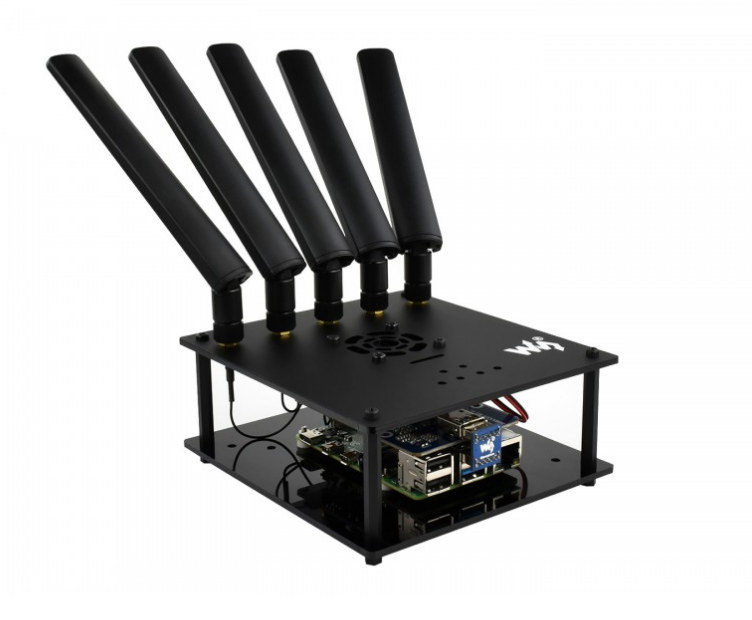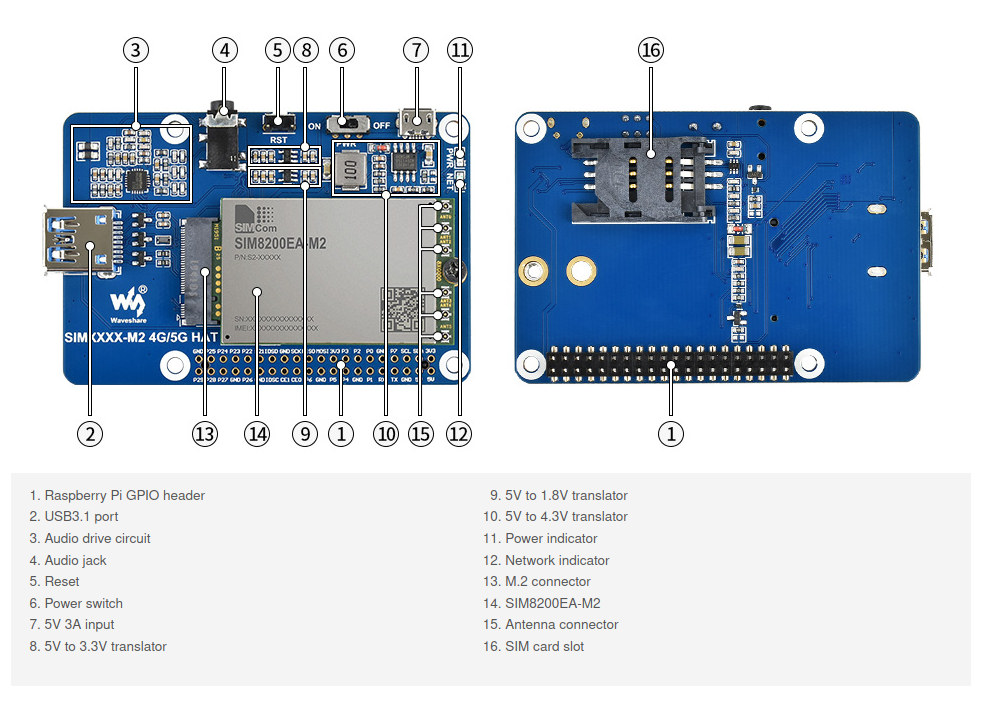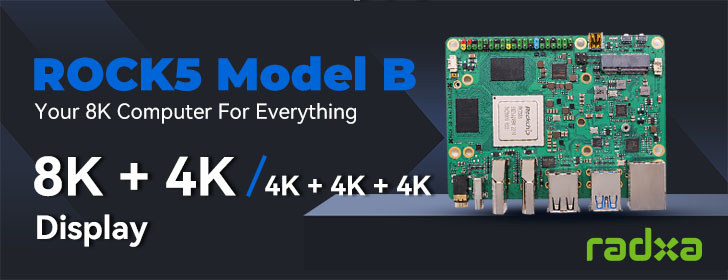The Raspberry Pi board has long been able to connect to cellular networks either via USB dongles or 3G or 4G LTE HATs that often include GPS as a bonus.
But you can now connect your Raspberry Pi 4 or other RPI SBC with a 40-pin header to 5G networks thanks to Waveshare SIM8200EA-M2 5G HAT for Raspberry Pi powered by Qualcomm Snapdragon X55 multi-mode multi-band modem offering 5G/4G/3G cellular connectivity.
 As we can see from the photo, the 5G add-on comes as part of a cool-looking kit with bottom and top acrylic plates, spacers, a cooling fan plus five antennas for cellular and GNSS connectivity.
As we can see from the photo, the 5G add-on comes as part of a cool-looking kit with bottom and top acrylic plates, spacers, a cooling fan plus five antennas for cellular and GNSS connectivity.
But the HAT itself integrates a SimCOM SIM8200EA-M2 M.2 module and offers the following specifications:
- Compatibility – Works with Raspberry Pi boards with a 40-pin GPIO extension header
- Cellular Connectivity
- SIM8200EA-M2 core module based on Qualcomm Snapdragon X55 platform with multi-mode multi-band support
- 5G/4G/3G networks support
- SIM card slot compatible with 1.8V / 3V SIM card
- Frequency bands and peak data rate
- 5G Sub-6G
- Bands – n1, n2, n3, n5, n7, n8, n12, n20, n25, n28, n40, n41, n66, n71, n77, n78, n79
- 4 Gbps (DL) / 500 Mbps (UL)
- 4G LTE
- LTE-FDD bands – B1/B2/B3/B4/B5/B7/B8/B12/B13/B14/B17/B18/B19/B20/B25/B26/B28/B29/B30/B66/B71
- LTE-TDD bands – B34/B38/B39/B40/B41/B42/B48
- 2 Gbps (DL) / 200 Mbps (UL)
- WCDMA / HSPA+
- Bands – B1/B2/B3/B4/B5/B8
- 42 Mbps (DL) / 5.76 Mbps (UL)
- 5G Sub-6G
- GNSS – Multi-constellation dual-band positioning: GPS, GLONASS, Beidou, Galileo, and QZSS (part of SIM8200EA-M2 module)
- USB – 1x USB3.1 port for testing AT commands ( based on 3GPP TS 27.007, 27.005, and V.25TER), sending messages, cloud communication, making phone calls, getting GNSS positioning data, etc.
- Audio – 3.5mm audio jack for audio operations (e.g. phone calls)
- Misc – 2x LED indicators for power and net status, on/off switch, reset button
- Power Supply – 5V/3A via micro USB port
- Dimensions – 85 x 56.7 mm (Compatible with Raspberry Pi HAT form factor)
The company states the 5G HAT works in most of the world including China, Europe, the Middle East, South America, North America, and supports both 5G NSA (4G+5G non-standalone networking) and SA (5G standalone networking).
Waveshare claims the HAT works with Windows, Linux, and Android, probably because it’s simply controlled via AT commands over the USB 3.1 port. The wiki page is up but currently empty.
There are some important shortcomings. First GNSS is not working right now, and it’s not possible to make phone calls now, but both should be fixed in future firmware updates. Then 5G looks to be encumbered by too many patents that increase the cost of hardware, and the kit sells for $399 with all parts minus the Raspberry Pi board that you need to purchase separately. Believe it or not, that’s actually a great deal, as the cheapest price I could find for SIMCom SIM8200EA‐M2 module only on Aliexpress is around $525.

Jean-Luc started CNX Software in 2010 as a part-time endeavor, before quitting his job as a software engineering manager, and starting to write daily news, and reviews full time later in 2011.
Support CNX Software! Donate via cryptocurrencies, become a Patron on Patreon, or purchase goods on Amazon or Aliexpress





So why are WiFi hot spots and USB mobile dongles so much cheaper, is a question that comes to mind?
Even a pine phone is cheaper. Yes there are design development cost and limited run production costs.
Because we’re talking 5G here. That Waveshare HAT is probably the cheapest 5G hardware I’ve found yet. Last time, I wrote about a WiFi 6 board with optional Quectel 5G IoT module, and price for the module was just under $500.
I can’t find 5G USB adapters yet, except some that take M.2 card. Having said that many people use 5G for “5GHz WiFi”, so I may have missed some models during my web search.
Wow 400 USD just for a HAT. Crazy expensive. And also: Who really gives a shit about 5G? Especially on > 6Ghz. I rather use 3G/4G, IEE 802.14.5 and Lora for certain use-cases.
Because 3G will go away, new infrastructure will be built using 5G…
Here already 3G is spotty due to frequency refarming to benefit 5G. It’s not my choice, but the hype around 5G pushed the operators to quickly adopt it.
Yeah, but the price is…painful. We’re trying to do M2M and things like IoT gateways with this stuff. $400 is painful and about 10 times the cost of the compute system we’re attaching it TO.
This isn’t too much at this time for 4G, 5G and gps. The timing for an IOT network cn be had from the GPS.
True. But as past shows us prices will drop. 3G dongles wer very expensive, now they are max 10$
4G dongles were playing in a cost league well above mortal’s capabilities.
Now go figure what will happen with 5G.
At least as long as our friends at the west coast of the Atlantic don’t kill more players besides Huawei in the 5G market…
cancer included ?
As well as the body implantable chip and bill gates’ vaccine!
LOL
I think it’s too early to make a huge investment in 5G. Still a long way to go. But Qualcomm chip whether they are sold for applications only or whatever usually have provisions for radios included in their features. This is a good price for a system which breaks that out and includes the RF parts.
FWIW it should also be able to do WIFI, since they are actually phone chips. I didn’t see that broken out, which is sort of odd. Maybe too busy for the GPIO to pi to do that to, and somewhat duplicative of what a lot of Pi boards have
The price is quite too high for most use cases. I suggest to wait for operators to deliver their own kits at lower prices. They will have no other choice, after having invested billions in hardware + radio frequency licenses. If accessing them is too expensive they won’t find customers. And most end users don’t care a dime about 5G, a part of the remaining ones are conspiracy seekers who reject it :-/
Agreed with the others commenting that this is probably not good for traditional low-data IOT or M2M.
People interested in this will be 5G routers, robotics knowing it is early days for 5G but want to test it for product concepts.
Having seen the evolution of 5G cards, I can say this is a new low price point for Simcom.
Hi Team,
How we can capture the 5G modem logs?
With Which tool we can capture?
Does it supports Wireshark?